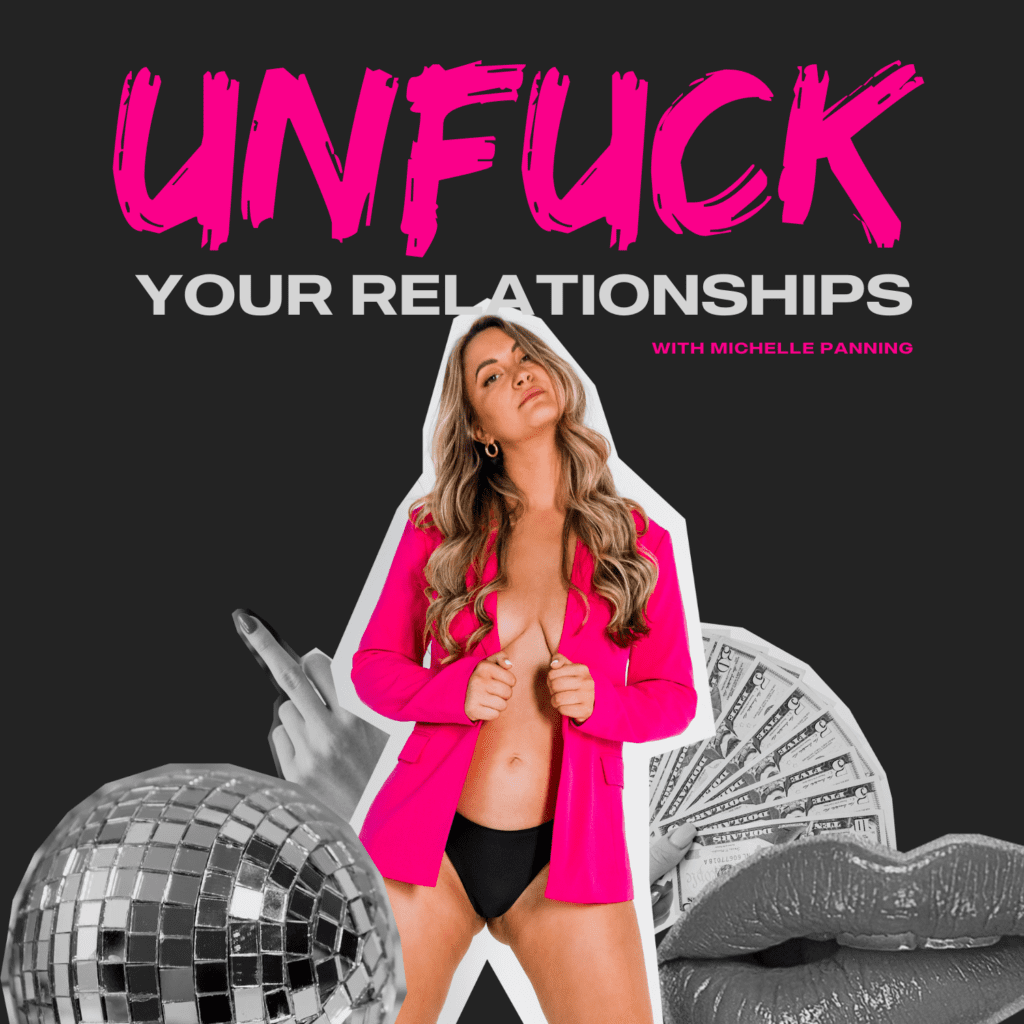Rewiring for Repair: How to Handle the Fear of Hurt in a Relationship
November 6, 2023
Hello, my loves. Today, we’re going to talk about something I see all the time…people doing everything they possibly can to avoid experiencing hurt in a relationship.
As humans, we are wired to avoid pain. I mean, you wouldn’t be reading this if you didn’t have some sort of fear of pain, right?
We all want an extraordinary relationship. We all want to understand how to be a better communicator, how to be a better partner, how to make sure our partners are on the same page as us…and all of that is so we can experience more pleasure and avoid being hurt in a relationship.
That is what humans are wired to do. It’s totally normal. However, there’s one little problem…

You Cannot Avoid Pain
No matter what, no matter how conscious of a relationship you are in, you are going to be hurt in a relationship. Period.
This need to avoid pain is something that I have helped hundreds and hundreds of women through, whether they’re single and in a state of chronic avoidance or in a relationship and still doing everything they can to avoid pain…even if that means they’re the ones inflicting pain instead.
Even though we’re wired to avoid pain, we have to acknowledge that it’s not realistic.
The reality is, we’re always going to be hurt in a relationship. Any relationship, romantic or otherwise.
I don’t mean that you’re going to get hurt all day, every day. I don’t even mean that you’re going to be hurt once a month. It could be a very rare thing—in fact, it doesn’t even have to be a huge wound.
Being hurt in a relationship doesn’t always look like your partner cheating on you or having an emotional affair. And I’m absolutely not talking about abuse of any kind.
What I’m talking about are micro-moments of hurt in a relationship. Maybe your partner says something that hurts your feelings, or maybe they made a decision without really considering how you felt about it, or maybe there was a simple misunderstanding, or maybe they said something that triggered your trauma response.
Regardless of what it is, there will be moments where you get hurt in a relationship. But that doesn’t mean your relationship is going to fall apart the second something goes wrong.

Fighting Well
One of my favorite quotes that I share very often is by Esther Perel. She says (and I’m paraphrasing, so bear with me): “Trust isn’t the idea that we won’t hurt each other. Trust is the idea that we will hurt each other, but we will both make attempts to repair.”
This concept has been so valuable in my relationship, because it’s helped teach us how to fight well.
And listen, I already know what you’re thinking: “What the fuck? You’re a relationship coach and you argue with your partner?”
Um…yeah? We’re two human beings learning how to navigate life together? Of course we disagree. Of course we have arguments. That’s fucking normal.
That said, we’re not screaming at each other. We’re not throwing things or calling each other names or being disrespectful. But we do get triggered sometimes, and we don’t always see eye-to-eye. And even so, we have learned how to fight with respect, with dignity, and still caring about the other person.
We don’t always get it right. Sometimes I say something that’s a little bit out of line. Sometimes he says something that’s a little bit out of line. Sometimes one of us gets too triggered and we need to walk away. But you know what? That’s just fine…because we trust each other to come back together and make the needed repair, because we’re committed to our relationship.
However, part of the reason this works is because we don’t try to hurt each other intentionally.
I’ve seen this a lot when people try to avoid being hurt in a relationship. In fact, this was my experience; I had such a fear of being hurt in a relationship that I would try to beat my partners to the punch. I would say the most hurtful thing that I could possibly think of, and I could get brutal. I mean, we were in an intimate relationship—I knew all their vulnerabilities, and I went right for the fucking jugular.
That’s not something I’m proud of, obviously, but I’m sharing that so you know that if you’ve done that, I get it. I resonate with you, and I understand where it comes from…but I also want you to know that it doesn’t have to be that way.
You can have a healthy relationship. I am my greatest testimonial, all right? I used to do all that cooked shit, and look at me now. You can get there. I promise.
Regroup and Repair
So, back to this concept of repairing after hurt in a relationship.
My partner Drew and I didn’t just learn how to argue in a way that actually elevates the relationship rather than destroys it; we also learned how to repair afterward, which is the biggest fucking thing you can do to heal hurt in a relationship.
What causes so many relationship breakdowns is not how much you argue, but the lack of repair afterward.
Let’s say you suffer a small rupture in the relationship—for instance, you have a tiff over who’s supposed to unload the dishwasher. It’s not a huge blow up, but if there’s no repair afterward, that thing just sits and festers…and when the next rupture happens, it can tear that first rupture right back open.
This is why people think that if you’re fighting or you’re arguing in a relationship, then that’s a sign of a bad relationship.
I don’t think that. I think that fighting and disagreements can actually become really beautiful catalysts for growth in a relationship.
However, that needs to be coupled with the ability and the know-how to actually repair hurt in a relationship. Because when you don’t repair hurt in a relationship, that untreated pain creates a lot of resentment, and we all know what it feels like to be resentful in a relationship.
It’s not fucking cute. It doesn’t feel good. It doesn’t feel good for you. It doesn’t feel good for your partner. It doesn’t feel good for your children.
Whatever the dynamic is, it just doesn’t feel good. But people tend to choose resentment over repair, because repair requires some confrontation, and that requires you to risk being hurt in a relationship.
When we are wired to avoid pain at all costs, we will bury things we shouldn’t bury, which is what creates resentment.
We avoid difficult conversations. We don’t speak our needs. We don’t speak our boundaries. We don’t speak our desires. We don’t say no even when we want to. We don’t speak up when our partner makes what they think is a harmless joke, but it actually deeply hurts us.
And then what do you think happens? Because you’re withholding all of your feelings, your thoughts, your emotions, your opinions, your perspectives, your boundaries, your needs, your desires, everything… you’re going to be resentful of your partner, because they’re not respecting things that you haven’t verbalized.
Part of the problem is that we don’t really create spaces in the relationship where we get to talk about these things. Most relationships don’t have a conscious container for that. So instead, people are just operating from a space of hoping their partner magically wakes up and decides to ask them what they need, what they want to see change, or what their boundaries actually are.
They’re unconsciously waiting for that moment to happen, and when it never fucking happens, resentment begins to build…and when resentment builds long enough, it turns into contempt.
If you don’t know, contempt is a state where you’re looking down on the person in front of you. There’s a sense that they’re fucking useless to you; there’s often a real attitude with it, and it results in people looking at their partners like, “Well, fuck you too, then. Now I’m indifferent to you. I’m done caring what you need, because you don’t care what I need.”
Indifference, by the way, is the worst feeling to be on the receiving end of. Having been the person giving contempt and the person receiving it…it is just plain shitty.
So we need to be having these conversations about how we’re feeling, what’s working for us, what’s not working for us, what we would love to see in our relationship, what our intentions are for the relationship, etcetera.

Relationship Check-Ins
To solve the issue of not having space in the relationship to have these conversations, my partner Drew and I actually do weekly and monthly relationship check-ins.
We have a weekly one where we just ask each other three questions, and then we do a monthly relationship check-in on the first Saturday of every month. With those, we go for a drive or we go out and have lunch, or sometimes we’re just at home in the backyard, and we go through a bunch of questions. We dive into everything in deep fucking detail.
When I tell you we have had some of the best fucking conversations we’ve ever had in these check-ins, I am so serious. We have learned so much about ourselves and about each other in these check-ins, and the practice has truly transformed everything about our relationship.
If you’re curious about what that looks like, Drew and I will be doing a two-day workshop called Relationship Revival all about our relationship check-ins. We’ve done this before, but we weren’t doing the weekly check-ins then, so that’s going to be a new factor!
You can find the link below to get access to that workshop. We look forward to seeing you there!
WORK WITH MICHELLE:
Sign up for RELATIONSHIP REVIVAL: https://michellepanning.thrivecart.com/relationshiprevival/
I’M HIRING! Apply for the business manager position here: https://form.jotform.com/232840601115444
Join The Connected Woman EXPERIENCE: https://michellepanning.com/the-connected-woman-experience
Apply to work with me 1:1: https://form.jotform.com/230497122673457
Join my email list to get access to exclusive pre-sale prices for programs: https://view.flodesk.com/pages/644afb566a53602a000e4ae3
Ready to do the work? You can find all courses, masterclasses, and more right here: https://michellepanning.com/all-offers
CONNECT WITH MICHELLE:
Instagram: http://www.instagram.com/michellepanning
Website: http://www.michellepanning.com

Rewiring for Repair: How to Handle the Fear of Hurt in a Relationship
MINDSET & EMBODIMENT MENTOR
I'm Michelle
about the host
I get it, girl. I’ve been there too. For years, I was going through the same experiences with men over and over again that left me feeling confused, anxious and pissed off.
I silenced myself in dating and relationships because I was terrified of being judged, rejected and abandoned. It all changed when I went through a break-up and thought “enough is enough. I cannot continue to repeat the same relationships with different men! Something HAS to change!”